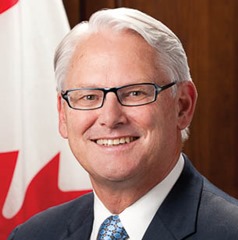A resurgent region
 Canada’s High Commissioner, Gordon Campbell, reflects on his visit to Northern Ireland and its significant potential.
Canada’s High Commissioner, Gordon Campbell, reflects on his visit to Northern Ireland and its significant potential.
Northern Ireland is on the verge of a significant breakthrough on the world stage. As a centre of aerospace technology in the UK, it is taking off but that is just part of the resurgence that is taking place.
October’s Invest NI conference was a fitting finale to a spectacular flurry of diverse events here in Northern Ireland over the past 18 months. It has brought a new positive focus on the part of investors to the people and the possibilities that Northern Ireland has to offer.
As Canada’s High Commissioner to the United Kingdom, I have watched the strong bonds – both cultural and economic – between our two countries grow. The conference drew participants from around the world looking to discover Northern Ireland’s strengths and the opportunities to do business. There is real potential for the international investor to take advantage of specialist skill clusters like financial services, ICT, advanced manufacturing, new technologies and of course, tourism.
Canadians have had positive experiences doing business in Northern Ireland, from the great success of Bombardier, Northern Ireland’s largest private sector manufacturing employer, to smaller mining companies exploring new ground.
We expect Northern Ireland to export £300 million worth of goods to Canada in 2013. Canadians and the people of Northern Ireland watched as Bombardier started C-Series passenger jet test flights in September at the company’s headquarters in Mirabel, Quebec.
The team at Bombardier’s facility here in Belfast designed and manufactured the advanced composite wings on the plane, and were a big part of that success. The new technology behind those wings was a product of £520 million investment by Bombardier that represents the largest single inward investment into Northern Ireland. It will bring an estimated 800 direct new jobs, but more significantly, it will create employment in support and supply industries and continue to mark Northern Ireland’s prominence in the European aerospace supply chain.
In recent years, Bombardier has worked closely with the UK Government and Invest NI to help the Northern Ireland Advanced Composites and Engineering Centre to grow. The aim here is to harness the available expertise in creating a regional technology hub. It is an exciting time, as that hub will set the scene for a new era in innovation in this valued partnership between our two countries in the aerospace sector.
I had the pleasure of meeting with Bombardier’s team in Belfast at the official opening of the wing manufacturing and assembly facility and seeing first-hand the new technology developed here. The announcement of 250 more jobs will, I am sure, be warmly welcomed.
My visit came on the heels of a very exciting time in your part of the world. The G8 leaders’ meeting in Lough Erne was an international success that put the stunning natural beauty of County Fermanagh firmly on the map for all the right reasons. The hospitality of the people of Northern Ireland charmed political leaders, delegations and the press from every corner of the world.
Arlene Foster and her team used every opportunity to showcase the best of Northern Irish products to great effect and I am confident that your tourism numbers will reflect all of the hard work and dedication by so many people that went in to making the summit a resounding success.
The Titanic Belfast visitors’ centre, where the Invest NI conference was held is terrific. The numbers in the first year are a clear sign of what can be accomplished when planners and designers choose to be bold and to look to our collective history for inspiration.
My visit to Northern Ireland culminated in my delivery of the annual Eaton Lecture at Queen’s University. Queen’s is an officially recognised Centre for Canadian Studies. It works to bring together academics and students to learn more about our country and our shared values.
Indeed, having a chance to meet with students and faculty was a fitting end to my trip as it not only reinforced our friendship, but also served to remind me of the hope and determination that the next generation of young people will contribute to Northern Ireland’s continued successes.





